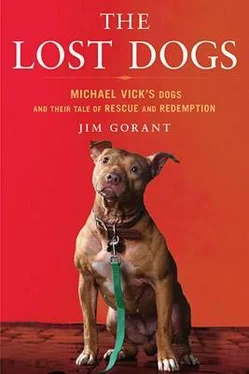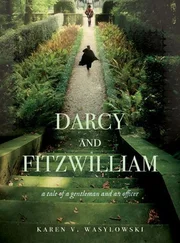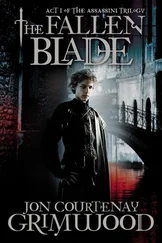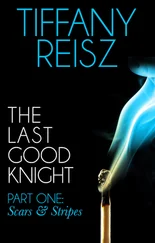At last the door swings open. A man comes in and the dogs bark and wag and shake their bodies with excitement. The man leaves again but reappears a moment later dragging a hose. He squeezes the nozzle and begins to spray water across the room. He moves down the line, hosing the bottom of each cage, letting the water sweep everything on the floor back into the drain and out of the building. Some dogs bite at the water as it flies past, some cower away from the stream, some sit utterly bemused and uncertain what to do. All of them bark.
Their cages are once again clean, but they are wet from the spray. The floor is wet and their little beds are wet too, so most of the dogs stand to stay out of the water. The man then goes around and puts fresh water in all of the bowls and gives each dog food. The brown dog eats. All the dogs eat and for a few minutes at least it is silent but for the chewing and the lapping.
By the time they are done, the man is gone and the door is once again closed. The meal seems to settle the dogs a little and some of them now sit or lie down in their space. Others pace. It is nice to be free of the heavy chain, but there are no birds or butterflies to chase here. There are no weeds to eat or rocks to chew. There is no circle in the dirt to trace over and over.
The brown dog- Sussex 2602-sits, her floppy ear asking questions of the world. The man had come and brought food, but would he be back, and when? And what would happen next? Would this room be their final stop? The anxiety and uncertainty wells up again and mingles with the boredom. The brown dog begins to bark. They all bark.
ON FRIDAY APRIL 27, 2007, two days after the raid at 1915 Moonlight Road, Michael Vick appeared at an event connected to the NFL Draft, which would take place the next day. It was his first public appearance since the news broke, and he was asked for an explanation. “I’m never at the house,” Vick said. “I left the house with my family members and my cousin. They just haven’t been doing the right thing. It’s unfortunate I have to take the heat. If I’m not there, I don’t know what’s going on. It’s a call for me to really tighten down on who I’m trying to take care of. When it all boils down, people will try to take advantage of you and leave you out to dry. Lesson learned for me.”
Jim Knorr didn’t catch the performance. He was working a cockfighting investigation in Page County, in northern Virginia. But he received a message on his office phone that day. It was from Bill Brinkman: “Call me about Vick.”
On Monday morning the two spoke on the phone and made plans to meet at Brinkman’s house a week later. When Knorr arrived in Surry County, Brinkman drove him by the Vick place, recounting the initial raid and what was found. Afterward the two went for dinner at Anna’s, an Italian restaurant in Smithfield, and Brinkman laid out the situation.
The initial raid had netted a fair amount of damning evidence but the case wasn’t a lock. First and foremost, they had the dogs. After that they had the training equipment, medical supplies, and all the rest. They had taken swabs of what they believed were bloodstains on the floor and walls of the large shed, but Brinkman wasn’t sure where to send the samples for confirmation. They had also received a call from a federal inmate claiming that before he was locked up he’d arranged and participated in dogfights with Bad Newz Kennels and Vick. A follow-up interview would be necessary.
Most important, he had Brownie. Brinkman sensed that the old guy knew even more than he had told so far, but he was a tough nut. He had no known address and spent his nights moving from one crash pad to another or dropping in on friends and relatives, and he made money doing odd jobs around town. Sometimes sullen and moody and sometimes ebullient, he would spoon out information in dribs and drabs, claiming to know nothing more one minute and then spilling a new load of information a while later.
Despite the lapses, Brinkman remained certain of Brownie’s willingness to testify. The guy had no fear of retribution. Still, Brinkman worried that he would either wander off or someone would convince him to change his mind about recounting what he had seen and heard at 1915 Moonlight Road. Brinkman felt that Brownie had to be put in a safe place for a while, preferably one outside of Surry County.
It was a big, complicated case, and Brinkman feared that Surry County didn’t have the resources or the expertise to pull off the investigation. He frequently worked alone or partnered with state police because he did not trust everyone around him. Over the years he’d even developed the habit of keeping the evidence he gathered during investigations locked up in his desk or car for fear of what would become of it if he turned it over.
Already he’d gotten the sense that not everyone in Surry County was on board with going after Michael Vick. The opportunity to search Vick’s house had come up quickly and unexpectedly, so the warrant had been filed and the raid scheduled without a lot of discussion among the local law enforcement hierarchy. When Brinkman first called in from the Vick house to request backup for the widening investigation, the officer who answered the call said, “You’ve got a lot of people around here pissed off.” Later that day, as Brinkman and others stood back and watched the dogs being led off the property, he had said out loud, “This case will probably lead to me getting fired.”
It didn’t take long to figure out the source of the discontent. Brinkman later told the Virginian Pilot that within a few days of the raid, his boss, Sheriff Harold Brown, told him that commonwealth attorney Gerald Poindexter, who represented the state of Virginia in Surry County, was unhappy with him. Soon thereafter, Brinkman was called into a meeting with Poindexter, who once represented Michael Boddie in a DWI case. Brinkman and Poindexter had clashed before. “Every time you met with him, it was a very unsettling, uncomfortable, degrading conversation,” Brinkman said to the Virginian Pilot. “Everything’s wrapped around race.”
Afterward, Brinkman claimed that Poindexter, who is black, made it clear that he didn’t like the idea of a young African American who had escaped from an underprivileged background and become something of an icon being dragged down, and he certainly didn’t want to be a part of it. (Brown and Poindexter later denied that any such conversations took place.)
When Poindexter subsequently reminded reporters that all the evidence was circumstantial and that even if dogfighting had taken place, it didn’t mean Vick was responsible, Brinkman took those statements as efforts to sway public opinion away from the idea that all roads led to Vick.
If the state truly wasn’t on board, it could be a significant problem. Virginia considered dogfighting and animal cruelty felonies, which made it an ideal venue to try the case. That was part of the reason Brinkman had reached out to Jim Knorr. He knew that if he could get the feds involved he could get around Poindexter. (A new federal law that would make dogfighting a felony was on the verge of being signed by President George W. Bush, but it would arrive too late for this case.) Brinkman and Knorr hoped there would be some other federal law that applied. They didn’t know all the answers, but they knew how to find out. There, in the dim light of a strip-mall Italian joint in rural Virginia, the two men planned their investigation.

The next day, Brinkman and Knorr found themselves outside 600 E. Main Street in Richmond, Virginia, a twenty-three-story office building highlighted by tan concrete, rows of black windows, and an architectural style that featured intersecting planes. It housed, among other things, the office of Chuck Rosenberg, the U.S. attorney for the Eastern District of Virginia. Brinkman and Knorr were scheduled to meet with assistant U.S. attorneys Brian Whisler and Mike Gill.
Читать дальше













